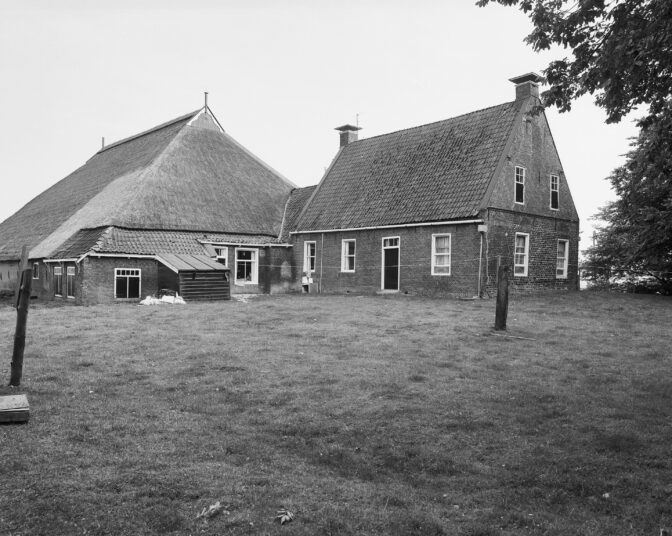A kop-hals-rompboerderij (literally: head-neck-torso farm) is a type of farm.
The living area formed the head of the farm, where the farmer’s family would have lived. A narrow corridor (the neck), sometimes with bedsteads for staff, connected the living area to the stables where the animals were housed (the torso). It is a type of farm mainly found in the northern provinces of Friesland and Groningen.

Kop-hals-rompboerderij in Aalsum, Friesland. Credits: L.M. Tangel, Cultural Heritage Service, document 151.616 (CC-BY-SA)


Actually, my father was witness to an accidental shooting of one of his buddies by another of his buddies in his WWII squad at just such a building that is now in the town of Randsdaal in Limburg.
Thanks for the interesting photo. Most of my mother’s side of the family lived in Friesland, so they may have had such a house, farm.
Congratulations on achieving such an internationally recognised qualification. like many qualifications gained in adulthood there would have been many many hours of researching and studying and perfecting the subject matter and assessed in examinations.
From where I live (Australia) your information has always been a highlight of my week to read the topics and recently made available archival information.
Because of your enthusiasm, I searched and revealed from available archives in The Netherlands a huge amount of information of my Opa’s Dutch merchant naval service from 1939 through to 1946. He sailed all over the world on three Dutch merchant ships, saw serious action in the South and North Atlantic and the Indian Oceans, and with serious action throughout the Mediterranean Sea with the invasions of North Africa, Sicily and Italy. He survived, but never talked, because of your ‘posts’ i uncovered details of his contribution and received his War service medal from The Netherland’s Department of Defense, which he never was awarded. He died in 1989 in Australia.
Thank you i will continue to look forward to reading your posts. J. HOFSTEE
How wonderful to read you enjoy my posts and were able to find so much new information!
Dear Yvette,
Thank you, I am very pleasantly surprised as to the amount of family history and other related information is available for free through the archives in The Netherlands. Compared to the English records which requires to be paid page by page from those various archives. I also like the ‘Dutch’ newspaper on line archives which is incredibly useful. When I started researching I was unable to read Dutch, now after several years i have become rather proficient reading / scanning the various records.
I look forward each week to reading you posts. thankyou. James
This type of house connected to barn was predominant in the colonial state of Maine, but I am not aware of any significant Dutch heritage there. Any comments?
There aren’t any Frieslanders here in Maine that I’ve met. The connected barn here is out of necessity after a generation or two on English living in deep snow for 4months, and the english barn style was modified placing the doors under the gable.